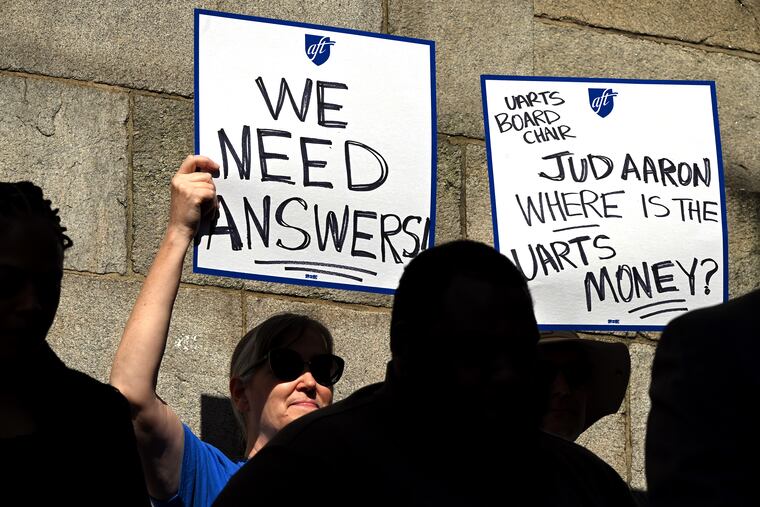These lawmakers say they want to prevent another collapse like UArts’. Here’s what they’re requiring.
Rep. Ben Waxman and Sen. Nikil Saval said legal language they pushed should prevent future university collapses.

As president of University of the Arts Student Association, Alex McFadden routinely met with the school’s top officials. They sat on the selection committee that helped pick Kerry Walk as president.
So when the school closed with just a week’s notice in June, shocking the city and changing the lives of thousands of staff, students, and alumni, McFadden blamed themself, the 2024 UArts graduate said Thursday — feeling like they should have seen the devastation coming.
It wasn’t until state officials stepped in that McFadden realized the closure was not their fault, they said.
“It was not my responsibility, because my alma mater was supposed to protect me,” an emotional McFadden said Thursday, standing on the steps of Hamilton Hall, UArts’ flagship building on South Broad Street. “None of this is normal, and none of this was supposed to happen to any of us, ever.”
McFadden spoke at a news conference where legislators touted a recently passed law they say is designed to prevent what happened at UArts from occurring again: a Pennsylvania college collapsing with no advance warning, and few protections for students and staff.
Written into the state budget passed in July was language that Rep. Ben Waxman (D., Philadelphia) and Rep. Bob Merski (D., Erie) pushed requiring the Pennsylvania Department of Education to put in place procedures to guarantee orderly closures of colleges. The regulations require colleges and universities to develop teach-out plans and preserve student and administrative records. Schools that fail to meet those requirements would not get state funding, which most private colleges receive despite not being public institutions.
Waxman said lawmakers realized “that we all could be facing another situation like the University of the Arts if we didn’t act,” he said.
» READ MORE: UArts’ sudden closure was a shock, but not a big surprise in the turbulent higher-ed landscape
Many state officials said they learned of the University of the Arts closure via an Inquirer article, and said if they had more advance warning, they might have been able to help avert whatever catastrophe felled the university. Officials have only said an unforeseen financial crisis forced them to close UArts.
“What happened here just a few months ago was unconscionable, unacceptable and cannot be repeated in the Commonwealth of Pennsylvania,” said State Rep. Jordan Harris (D., Philadelphia), chair of the House Appropriations Committee. “To find out that a university is closing in a newspaper is beyond unacceptable.”
State Senator Nikil Saval (D., Philadelphia) called the school’s closure “an irreparable harm to our city,” an act that upended the lives of thousands.
“Months later, the circumstances around the closure remain murky and opaque, and accountability has not yet come,” Saval said. “We cannot let this manufactured crisis in higher education become an epidemic.”
Madison Claus, a UArts alum who worked as an administrative assistant at the university until its closure, said she stayed “despite the low pay, despite being always overworked, because I believed it was a special place where interdisciplinary art could flourish. I also stayed for the students. The most rewarding part of the job was seeing students have exciting breakthroughs in their artistic practice.”
Claus, who met her husband at UArts, still has not found a new job. She had to delay her honeymoon and revamp her finances because of the closure.
The worst part?
“I am heartbroken for Philadelphia for the void that has been created for what it means for the future of art making,” Claus said. “Philly is scrappy and vibrant and resilient. The void left by the sudden shuttering of UArts will be filled, but it will take time and effort and it will never be the same. Something truly irreversible has taken place. And I fully believe that this whole ordeal did not have to be as swift, as catastrophic, as mismanaged, as it was.”
Even legislators seeking answers said they have been met with radio silence from those connected to UArts for months. The state Attorney General’s Office is investigating, but details have been scant.
Months of negotiations between UArts and Temple University over a possible merger or acquisition broke down after a major donor to UArts’ $62 million endowment expressed opposition to the money going into Temple as part of the deal, The Inquirer reported.
» READ MORE: Students without homes. Faculty without jobs. These are the faces behind the UArts closure.
Asked about the university buildings — several desirable pieces of property in the heart of Center City, on the Avenue of the Arts — Waxman said there’s been no news.
“There’s still a lot of process that has to play out before we know what is going to happen with the assets,” Waxman said.
Harris said he could not go into details about any talks that might be going on behind the scenes, but “I will say that we believe that the University of the Arts can and should rise again. I’m not sure what fashion that might be, but the history and the legacy of this school should not end here.”